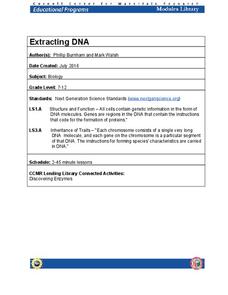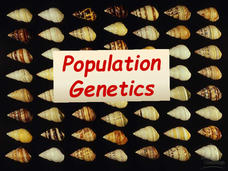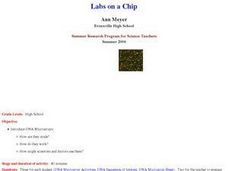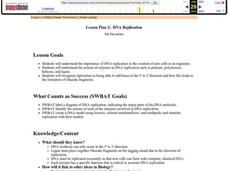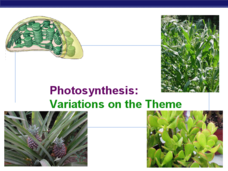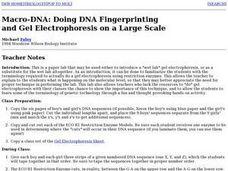Cornell University
Extracting DNA
Uncover the basics of DNA structure through exploration activities. Collaborative groups build DNA models and recreate the process of replication. Then, using plant cells such as peas or strawberries, they extract a DNA sample.
Biology Junction
Population Genetics
Genetic variation shows the health of a population, yet cheetahs show very little variation over that last 10,000 years. Scholars learn the importance of genetic variation in populations after viewing an informative presentation. It...
Curated OER
Light My Fire ...Fly
Students examine fire flies. They measure the frequency of light stimulus used by communicating fire flies. Students explore the concept of organisms using light to communicate. Students film the fire flies and quantify the duration...
Curated OER
Labs on A Chip
Students are introduced to DNA microarrays. They discuss how scientists and doctors use them and how they work. They complete a worksheet and discuss their findings.
Curated OER
DNA Replication
Students create a model of DNA and simulate replication with their models in an activity that uses licorice, colored marshmallows, and toothpicks. Students also label a diagram of replication and indicate major parts of the DNA molecule.
Curated OER
Photosynthesis: Variations on the Theme
Leaf structure and its specializations for photo-respiration are detailed here. Slides provide information about Photo-respiration biochemistry and its impact. A class learning about classic respiration will appreciate the comparisons...
Curated OER
More Basic Biotechnology Tools
You can use these slides to explain the many complicated steps of the Polymerase Chain Reaction. The diagnostic and forensic uses of gel electrophoresis are detailed. This PowerPoint could be used to communicate facts, or to prompt...
Curated OER
A Little More Advanced Biotechnology Tools: Better Plasmids
A nice set of information that will help your students understand the process of using recombinant plasmids. DNA hybridization and blotting mechanisms help illustrate expressed genes and the concepts behind the Human Genome Library....
Curated OER
A Little More Advanced Biotechnology Tools; Better Plasmids
After using this DNA and plasmids slide show, the steps of the delicate procedures of southern blotting and DNA libraries should be more clear to your students. Students will read the guidelines and are also prompted to answer questions...
Curated OER
Got Gas? How Much?
Learners perform an experiment that measures respiration. In this performing an experiment that measures respiration lesson, students discuss aerobic and anaerobic respiration. Learners measure the gas produced by putting yeast in...
Curated OER
West Nile Virus Strikes Again
Students examine the West Nile virus and how it is impacting an American Indian reservation, In this virus lesson students devise a prevention plan for an Indian reservation to help limit the transfer of the West Nile virus.
Curated OER
Macro-DNA: Doing DNA Fingerprinting
Students explore gel electrophoresis using paper models. They model DNA sequences and shade the boxes on their Gel Electrophoresis Sheet which represent the individual fragments.
Curated OER
Review of Cell Organelles
In this cell organelles learning exercise, students read the structure and function of different plant and animal cell organelles to determine what organelle is being described. Students write in the 15 organelles into a chart.
Curated OER
Cutt-Off Genes
Learners explore how gene sequence analysis can be used to examine phylogenetic similarities of different organisms. Students work in groups to simulate a gel electrophoresis separation of fragments using poster board to create their gel.
Curated OER
Replication of DNA
In this DNA worksheet, students read about the DNA replication process, step by step. Then students complete 1 multiple choice and 4 short answer questions.
Curated OER
Sea Urchin Embryology
Students explore the process of evolution. They examine examples of how homeotic genes may work and obtain gametes. Using a microscope, students observe the fertilization of sea urchins. They video tape the process and write a...
Curated OER
Risk Factor Roulette
Students examine "multiple chemical sensitivity" and how it relates to genetic variation and environmental factors. They read an article, conduct research, and identify risk factors related to chemical sensitivity, asthma, breast cancer,...
Curated OER
Heredity And Environment
Students complete a pre-test on the relationship between heredity and the environment. As a class, they write down descriptions of themselves and identify which traits can be changed and not changed. In groups, they determine which genes...
Curated OER
Anatomy and Physiology "Quickies"
Students use a variety of creative writing tools within this assignment: poems on particular organ systems, write a short story and/or create a word graph. They are involved in a demonstration of lactic build up in the muscles, a...
Curated OER
Who Is It?/Who Done It?
Students conduct an experiment that allows them to assess individual differences in random DNA sequences and apply those differences when solving a forensic problem. After discussing the polymerase chain reaction and its use to identify...
Curated OER
Protein Synthesis
In this protein synthesis worksheet, students use a given strand of DNA to write the complimentary base pairs. They transcribe the message to the RNA and then they translate the message into the proper amino acids using the codons on the...
Curated OER
Worm Composting
Second graders discuss worm composting. In this decomposition instructional activity, 2nd graders look at the anatomy of the worm and how it eats food. They have their own worm bin and review what foods can and can not be given to the...
Curated OER
How Genes Work Lesson Plan
Students define the key terms that are the structure and function of DNA. In this genetics lesson students complete a lab activity in which they construct a model DNA structure.
Curated OER
Macro-DNA: Doing DNA Fingerprinting and Gel Electrophoresis
Students create numbered DNA sequences by taping together the order of the sequence. They count the number of bases in their RFLP's and shade the boxes on their Gel Electrophoresis sheets that represent individual fragments. They...


